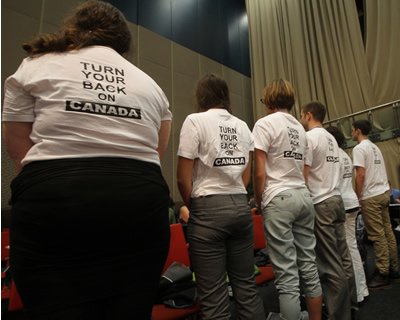Questioning the success of the global free Zimbabwe protests
Wednesday, January 25th, 2012 by Upenyu Makoni-MuchemwaSW Radio Africa (London) reports that ‘Hundreds turned out for the Global Free Zimbabwe protests’. The protests were organised by MDC-T in an effort to pressure the South African government and SADC to ensure that ZANU PF is forced to honour the Global Political Agreement.
Zimbabwe vigil organiser, Rose Benton explained to SW Radio Africa that the London part of the protests was ‘a very big success’. The Zimbabwean community in London is estimated to number 100 000 and is largely concentrated in London. An estimated 300 gathered for the protest there.
It is estimated that millions of Zimbabweans reside outside the country’s borders. However, globally, less than 1000 people participated. Success, I suppose, is relative.
As one half of government and a party to the GPA itself, I wonder at the naiveté shown by the organisers of the protests. There is no denying that ZANU PF has stymied implementation of the GPA. But after having fought for democracy for so long, I would have hoped that MDC-T might have formulated a different strategy that best utilises the tools they have at hand. Contrary to what the MDC-T would have Zimbabweans in the Diaspora believe, it is not entirely powerless in government. Combined all the MDC factions hold a majority in both houses of Parliament. Given these circumstances it is surprising that key provisions to the GPA such as amendments to POSA and AIPPA are yet to be passed into law.
Like ZANU PF, MDC-T has consistently failed to deliver on its promises to the people of Zimbabwe. These protests are nothing more than a mass diversion to take away attention from the real issues and dissociate that party from the mess it too has made of this transitional period. Moreover, MDC-T has gotten into the disturbing habit of looking for a big brother in its fight with ZANU PF. The MDC-T persists in appealing to an international community that is largely fatigued of the Zimbabwean situation and is plagued by its own problems. By doing so, MDC-T plays directly into the hands of ZANU PF who accuse the party’s leadership of letting their decisions be made by foreign ambassadors. Acquiring power is a struggle in itself, the difficulties of which should never be underestimated. No amount of hand-wringing and petition signing is going to make it any easier. After years of South African mediation and questionable sanctions, none of which have been effective in wresting power from ZANU PF, MDC-T really should know better. And if that party cannot hold its own, it shouldn’t be in the ring.










